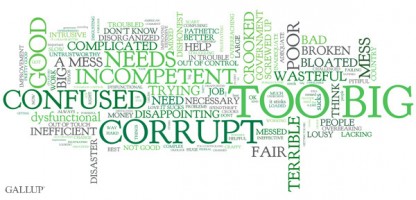Widgetized Section
Go to Admin » Appearance » Widgets » and move Gabfire Widget: Social into that MastheadOverlay zone
Transforming the Federal Government’s Reputation in the “Post Truth” Era Is Now “Job One” for Public Administration
The views expressed are those of the author and do not necessarily reflect the views of ASPA as an organization.
by Erik Devereux, American University.
Jan. 20, 2017
 In September 2010, USA Today and Gallup conducted a survey of Americans that asked respondents to offer one word or phrase describing their impression of the federal government. A “word cloud” based on the prevalence of each type of response accompanies this column. Gallup coded about 72 percent of the responses as representing a negative impression. Here are the top three responses by count:
In September 2010, USA Today and Gallup conducted a survey of Americans that asked respondents to offer one word or phrase describing their impression of the federal government. A “word cloud” based on the prevalence of each type of response accompanies this column. Gallup coded about 72 percent of the responses as representing a negative impression. Here are the top three responses by count:
- Too big
- Corrupt
- Confused
This disastrous set of beliefs is not the result of facts, but of a sustained propaganda campaign that dates back to the early 1950s and accelerated with brutal force in the early 1980s. There are numerous, credible studies that compare the federal government to every other national government on Earth that consistently find, based on sound measures, that the federal government is not too big, not corrupt and not confused, let alone any of the other highly pejorative terms in the word cloud.
In this post-truth era, in which propaganda has gained a new foothold on the American electorate, it will not matter that the federal government actually is a “lifeline” to many of the same persons who provided such negative views when surveyed. Those persons apparently are willing to authorize efforts to tear down the federal government with a viciousness that many long-time observers of political and public administration appear incapable of anticipating. It may take generations for the federal government to recover from what is about to transpire.
What then is to be done?
One response is for public administration to make it a top priority to transform the reputation of the federal government. This means putting away concerns about “reinventing government” or “improving public sector efficiency” or the “new public management.” Those battles are lost. Even worse, some of those concerns have offered ammunition for those leading the propaganda attack against government. Instead, it is time to staff the barricades in an outright public defense of the federal government as being actually understaffed, under-resourced, exceedingly honest and most often very good in what it does.
Another component is to reverse decades of allowing so much of what the federal government does to operate out of sight and under the radar, including through the tax code. The government will not be able to shed light on all of the programs that touch so many Americans on a daily basis. Everyone in a position to publicize those programs and their impacts must lend a hand immediately. A lesson here for the longer term is that we must push forcefully to keep the government on the surface, visible and hopefully more appreciated, in the future. In the short term, we must contribute to informing every American, in as personal of a way as possible, about the positive role federal government programs play in their daily lives and the implications of undermining those programs. So, give public talks, visit with groups and organizations, write op-eds, get on TV and radio, use social media, evangelize.
Here is one example worthy of much publicity: SSI disability. Economists have been open for years about how SSI disability operates as a counter-cyclical income support program. During economic downturns, SSI disability enrollment swells with persons who will leave the program when improved conditions offer acceptable jobs (meaning they are financially better off working than remaining on disability). It turns out that many persons who use disability in this manner also are those who (a) do not conceive of it as “welfare” (which it most certainly is) and (b) are among those highly likely to hold negative opinions about the federal government AND “welfare recipients.” Enough is enough. We all need to use such examples as leverage in the effort to improve appreciation for the federal government.
The stakes right now are far higher than many acknowledge. I have heard a long list of “such and such will never happen” from various experts while watching, one by one, as recent events prove each completely wrong. It is happening and putative limits on the negative possibilities are unreliable. Public administration is a field under concerted attack that has opted in the past to duck and cover. This time expect something more in the 20 megaton range—there will be no benefit to hiding behind a wall except to leave behind a shadow of our government to somehow persevere in a complex and unforgiving world.
Erik Devereux has worked for 25 years in the public policy and management field. Erik currently is an independent consultant to nonprofit organizations and to higher education and teaches applied policy analysis at American University. He has a B.S. from the Massachusetts Institute of Technology (Political Science, 1985) and a Ph.D. from the University of Texas at Austin (Government, 1993). Contact Erik at [email protected].


Erik Devereux
March 30, 2017 at 5:25 pm
The Washington Post has published an article on 3/30/2017 documenting increased use of SSI disability among poor rural white voters, the same voters who have supported candidates for national office who favor dismantling most of the federal government including broad swaths of the social safety net. Here is a link to the article online:
https://www.washingtonpost.com/sf/local/2017/03/30/disabled-or-just-desperate/